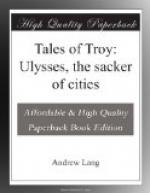There was a prophecy that Priam’s wife would give birth to a burning torch, so, when Paris was born, Priam sent a servant to carry the baby into a wild wood on Mount Ida, and leave him to die or be eaten by wolves and wild cats. The servant left the child, but a shepherd found him, and brought him up as his own son. The boy became as beautiful, for a boy, as Helen was for a girl, and was the best runner, and hunter, and archer among the country people. He was loved by the beautiful OEnone, a nymph—that is, a kind of fairy—who dwelt in a cave among the woods of Ida. The Greeks and Trojans believed in these days that such fair nymphs haunted all beautiful woodland places, and the mountains, and wells, and had crystal palaces, like mermaids, beneath the waves of the sea. These fairies were not mischievous, but gentle and kind. Sometimes they married mortal men, and OEnone was the bride of Paris, and hoped to keep him for her own all the days of his life.
It was believed that she had the magical power of healing wounded men, however sorely they were hurt. Paris and OEnone lived most happily together in the forest; but one day, when the servants of Priam had driven off a beautiful bull that was in the herd of Paris, he left the hills to seek it, and came into the town of Troy. His mother, Hecuba, saw him, and looking at him closely, perceived that he wore a ring which she had tied round her baby’s neck when he was taken away from her soon after his birth. Then Hecuba, beholding him so beautiful, and knowing him to be her son, wept for joy, and they all forgot the prophecy that he would be a burning torch of fire, and Priam gave him a house like those of his brothers, the Trojan princes.
The fame of beautiful Helen reached Troy, and Paris quite forgot unhappy OEnone, and must needs go to see Helen for himself. Perhaps he meant to try to win her for his wife, before her marriage. But sailing was little understood in these times, and the water was wide, and men were often driven for years out of their course, to Egypt, and Africa, and far away into the unknown seas, where fairies lived in enchanted islands, and cannibals dwelt in caves of the hills.
Paris came much too late to have a chance of marrying Helen; however, he was determined to see her, and he made his way to her palace beneath the mountain Taygetus, beside the clear swift river Eurotas. The servants came out of the hall when they heard the sound of wheels and horses’ feet, and some of them took the horses to the stables, and tilted the chariots against the gateway, while others led Paris into the hall, which shone like the sun with gold and silver. Then Paris and his companions were led to the baths, where they were bathed, and clad in new clothes, mantles of white, and robes of purple, and next they were brought before King Menelaus, and he welcomed them kindly, and meat was set before them, and wine in cups of gold. While they were talking, Helen came forth from her fragrant chamber, like a Goddess, her maidens following her, and carrying for her an ivory distaff with violet-coloured wool, which she span as she sat, and heard Paris tell how far he had travelled to see her who was so famous for her beauty even in countries far away.




